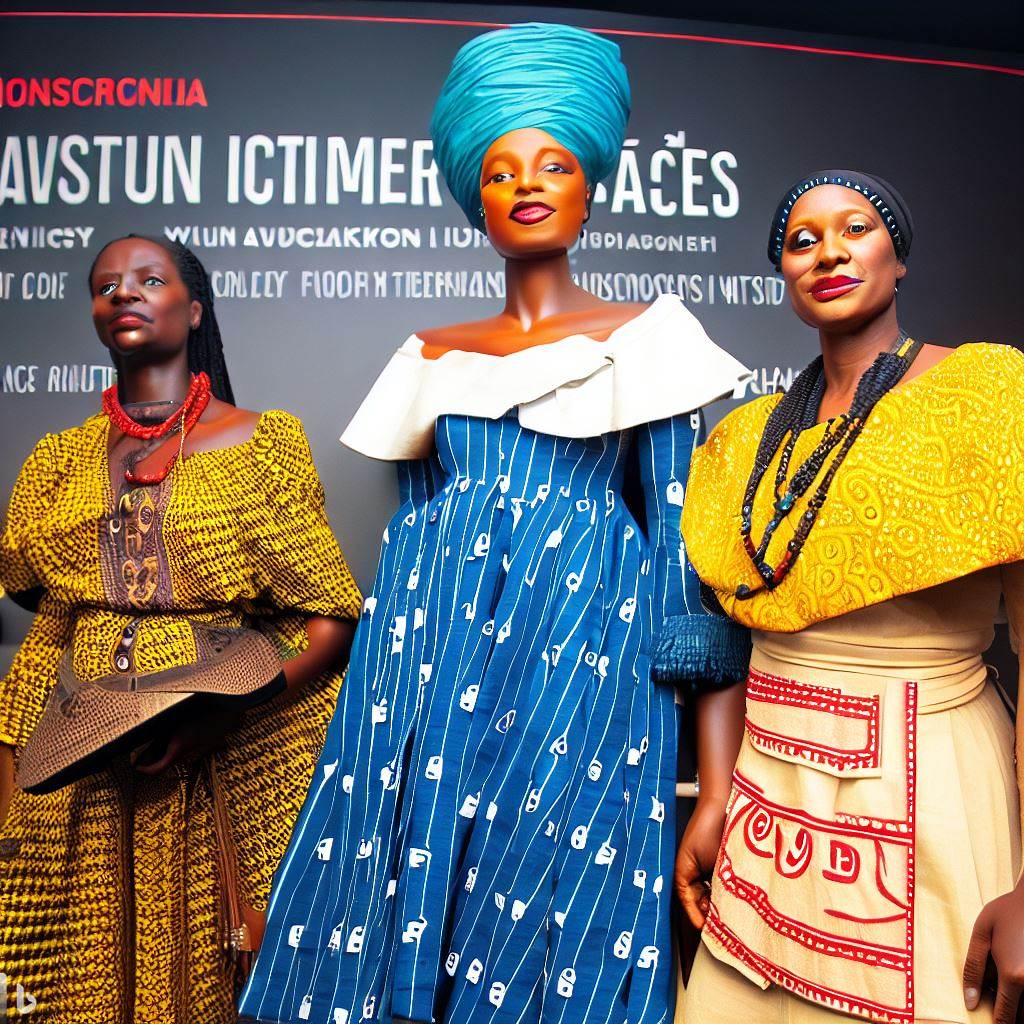Introduction
A. Brief Explanation of the Topic
Photography in Nigeria has evolved, becoming a viable full-time career path for many.
This section delves into what aspiring photographers should anticipate.
B. Importance of Photography as a Full-Time Job in Nigeria
- Thriving Creative Industry: Photography plays a pivotal role in Nigeria’s booming creative sector.
- Economic Viability: It offers substantial income potential, contributing to personal and national economies.
- Diverse Opportunities: Photographers can specialize in events, fashion, wildlife, and more.
- Cultural Preservation: Photography preserves Nigeria’s rich cultural heritage, fostering appreciation.
- Global Reach: Nigerian photographers can gain global recognition and clientele.
- Innovation Hub: The industry constantly adapts, inviting innovation and new trends.
- Job Creation: It generates employment opportunities for makeup artists, stylists, and more.
- Personal Fulfillment: Pursuing a passion can lead to a fulfilling, lifelong career.
Understanding these aspects is vital for anyone considering photography as a full-time occupation in Nigeria.
Overview of the Photography Industry in Nigeria
A. Current state of the industry
- The photography industry in Nigeria has experienced significant growth in recent years.
- Increased access to cameras, both professional and smartphone ones, has contributed to this growth.
- There is a growing demand for photography services in various sectors, including weddings, fashion, events, and advertising.
- Nigerians are becoming more aware of the importance of quality visuals in promoting their businesses and personal brands.
- Photography has evolved from being just a hobby to a viable career option in Nigeria.
B. Growth and opportunities in the sector
- The photography industry in Nigeria has witnessed steady growth due to the rise of social media platforms.
- Social media has created a demand for high-quality visual content, leading to increased job opportunities for photographers.
- Photographers now have the chance to collaborate with influencers, brands, and businesses for promotional shoots.
- The fashion industry in Nigeria has also played a significant role in the growth of photography as a full-time job.
- Photographers are in demand for fashion shoots, runway events, and magazine editorials.
- Additionally, the tourism industry provides opportunities for landscape and travel photographers.
C. Challenges faced by photographers
- One of the major challenges photographers face in Nigeria is intense competition in the industry.
- With the increasing number of photographers, it can be challenging to stand out and secure clients.
- Photographers often struggle with finding a niche and developing their unique style to differentiate themselves.
- Another challenge is the lack of adequate training and mentorship opportunities for aspiring photographers.
- Many photographers have to learn through trial and error, which can be time-consuming and frustrating.
- There is also the issue of equipment cost, as high-quality cameras and accessories can be expensive to acquire.
- Photographers often have to invest a significant amount of money in their equipment to provide top-notch services.
Basically, the photography industry in Nigeria has experienced remarkable growth and offers numerous opportunities for photographers.
However, it comes with its fair share of challenges, including intense competition, finding a niche, and expensive equipment.
As the demand for quality visual content continues to rise, photographers who can overcome these challenges and provide exceptional services will enjoy a successful full-time career in Nigeria.
Read: Fashion Photography in Nigeria: Glamour Meets Talent
Skills and Knowledge Required for a Full-Time Photography Job in Nigeria
A. Technical skills (camera settings, lighting, composition, etc.)
- Mastering camera settings is crucial to capture the desired shot.
- Understanding lighting and how to manipulate it is essential to create compelling images.
- Skillful composition can transform an ordinary photograph into a work of art.
B. Knowledge of different photography genres (portrait, landscape, product, etc.)
- Each photography genre has its own unique requirements and techniques.
- Understanding the nuances of portrait photography involves capturing the essence and emotions of the subject.
- Landscape photography requires an eye for detail and the ability to showcase the beauty of natural surroundings.
- Product photography demands expertise in presenting items in an appealing and marketable way.
C. Editing and post-processing skills
- Proficiency in editing software is essential for enhancing and retouching images.
- Knowledge of color correction, noise reduction, and other techniques can significantly improve the final result.
- Understanding the balance between natural-looking edits and avoiding excessive manipulation is crucial.
D. Business and marketing skills
- Running a photography business in Nigeria requires knowledge of marketing strategies and branding.
- Building a strong portfolio and establishing a personal brand are key to attracting clients.
- Networking and building relationships with potential clients and other professionals in the industry is essential for success.
E. Continuous learning and keeping up with technology
- The field of photography is constantly evolving, and staying informed about new equipment and techniques is essential.
- Attending workshops, seminars, and photography courses can help improve skills and stay up-to-date.
- Embracing new technologies and incorporating them into the creative process can set photographers apart from the competition.
Generally, pursuing a full-time photography job in Nigeria requires a combination of technical skills, knowledge of different photography genres, editing and post-processing skills, business and marketing acumen, as well as a commitment to continuous learning.
Mastering these skills can open doors to a successful and fulfilling career in photography.
Read: Insider’s Look: Day in the Life of a Professional Nigerian Photographer
Income and Earning Potential of Full-Time Photographers in Nigeria
A. Different income sources (weddings, events, commercial shoots, etc.)
Being a full-time photographer in Nigeria comes with various income sources.
Photographers can earn money through weddings, events coverage, commercial shoots, and more.
These different avenues provide opportunities for photographers to diversify their income streams.
B. Factors affecting earnings (experience, reputation, niche, etc.)
Several factors affect the earnings of full-time photographers in Nigeria. Firstly, experience plays a crucial role.
Photographers with more years in the industry usually have a higher earning potential due to their refined skills and established client base.
Additionally, a photographer’s reputation greatly influences their income.
Positive word-of-mouth from satisfied clients and industry recognition can attract more clients and command higher rates.
Finding a niche can also be beneficial, as specializing in a specific type of photography can make a photographer stand out, leading to higher earnings.
C. Average earnings and potential for growth in the industry
The average earnings of full-time photographers in Nigeria can vary significantly. Factors such as location and client base influence income levels.
However, according to industry estimates, a skilled and established photographer can earn between ₦100,000 to ₦500,000 ($250 to $1,250) per month.
As the photography industry in Nigeria continues to grow, the potential for income growth is promising.
With increased demand for professional photography services, photographers have opportunities to expand their client base and charge higher rates.
By continuously honing their skills, photographers can attract higher-paying clients and increase their earning potential.
Moreover, diversifying income streams can also contribute to overall growth.
Full-time photographers can consider offering additional services such as photo editing, printing, or even teaching photography workshops.
These additional services can supplement their photography earnings and enhance their financial stability.
Essentially, full-time photographers in Nigeria have various income sources, including weddings, events, and commercial shoots.
Factors like experience, reputation, and niche play a significant role in determining earnings.
The average earnings range from ₦100,000 to ₦500,000 ($250 to $1,250) per month, with potential for growth.
By expanding services, refining skills, and building a strong client base, photographers can thrive in this industry.
Read: Photography Workshops and Seminars: Learning in Nigeria
Determining the Financial Viability of Photography as a Full-Time Job in Nigeria
When considering photography as a full-time job in Nigeria, it is crucial to evaluate its financial viability.
This section will explore key aspects related to financial goals, equipment costs, marketing expenses, competition, and market demand.
A. Evaluating Personal Financial Goals and Responsibilities
- Assess your financial aspirations and the level of income you need to sustain your lifestyle.
- Consider your financial responsibilities, such as rent, bills, and other necessary expenses.
- Analyze whether the income from photography can meet your financial obligations adequately.
B. Cost of Equipment and Maintenance
- Photography requires a significant investment in high-quality cameras, lenses, lighting equipment, and editing software.
- Regular maintenance, repairs, and upgrades might be necessary to ensure optimal equipment performance.
- Calculate the initial cost of purchasing equipment and estimate ongoing expenses for maintenance.
C. Marketing and Promotional Expenses
- Establishing a photography business requires effective marketing strategies to attract clients.
- Allocate a budget for online advertisements, website development, business cards, brochures, and other promotional materials.
- Consider hiring a professional marketer or investing time and effort in self-promotion via social media and networking.
D. Competition and Market Demand Assessment
- Research the photography market in Nigeria to understand its competitiveness and potential demand.
- Analyze the existing competition, their pricing, portfolio quality, and unique selling points.
- Determine your niche and assess if there is a demand for your specific photography style or specialization.
- Identify potential clients, study their preferences, and consider the market saturation in your chosen photography genre.
By thoroughly evaluating these factors, you can make an informed decision regarding the financial viability of pursuing photography as a full-time job in Nigeria.
Read: Underwater Photography in Nigeria: An Unexplored Adventure

Working Conditions and Lifestyle as a Full-Time Photographer in Nigeria
A full-time job as a photographer in Nigeria comes with unique working conditions and a challenging lifestyle. Let’s explore what to expect.
A. Irregular working hours and flexibility
Working as a full-time photographer in Nigeria often means having irregular working hours and the need for flexibility in your schedule.
Many events and occasions, such as weddings, parties, and corporate functions, happen during evenings and weekends, requiring you to be available during those times.
You may need to sacrifice your personal time and be prepared to work long hours, especially during peak seasons.
It is essential to manage your time effectively and prioritize your commitments to maintain a healthy work-life balance.
B. Physical demands and challenging environments
Photography can be physically demanding, especially when covering events that require constant movement and capturing moments in different settings.
Photographers need to be physically fit and capable of carrying heavy equipment for extended periods.
In Nigeria, outdoor shoots might present challenging environments, such as hot and humid weather or difficult terrains.
Being adaptable and prepared to handle these conditions is crucial to deliver high-quality work consistently.
C. Balancing personal and professional life
Being a full-time photographer can sometimes blur the line between personal and professional life.
As you work on building your photography career, you may find yourself dedicating significant time and energy to your craft.
It is vital to find a balance between your personal life, relationships, and your professional commitments.
Prioritizing self-care and maintaining strong support systems will help you navigate these challenges effectively.
D. Benefits and perks
While being a full-time photographer in Nigeria may come with its challenges, there are also several benefits and perks to enjoy.
- Creative expression: Photography allows you to express your creativity and capture unique moments in a visually artistic way.
- Independence and control: As a full-time photographer, you have the freedom to work independently and control your creative process and business decisions.
- Opportunities for growth: Nigeria offers a diverse range of events and occasions, providing ample opportunities for photographers to expand their portfolios and experience.
- Potential financial rewards: With dedication and skill, photography can be a lucrative profession, especially when you establish a strong reputation and client base.
- Networking and collaboration: The photography industry in Nigeria is vibrant, and being a part of it allows you to network and collaborate with fellow professionals, opening doors to new opportunities and knowledge sharing.
It’s important to approach photography as a full-time job in Nigeria with a realistic understanding of the working conditions and lifestyle it entails.
By embracing the challenges and taking advantage of the benefits, you can thrive in this profession and create a successful career.
Challenges and Potential Risks of Pursuing Photography as a Full-Time Job in Nigeria
A. High competition
- Numerous talented photographers in Nigeria create a fiercely competitive market.
- To stand out, photographers must continually improve their skills and offer unique services.
- Differentiating oneself from other photographers can be a daunting task in such a saturated industry.
B. Lack of appreciation and understanding from clients
- Some clients fail to recognize the value of professional photography and may have unrealistic expectations.
- Educating clients about the creative process and the costs involved can be challenging and time-consuming.
- Building trust and fostering good communication skills are essential to overcome this challenge.
C. Inconsistent income and financial instability
- While some months may bring in a good income, other months can be financially tight.
- Seasonal variations and the unpredictable nature of the market make it difficult to maintain a stable income.
- Financial planning and diversifying income sources can help photographers navigate these uncertainties.
D. Constantly evolving market trends and technology
The photography landscape is constantly changing, with new trends and technologies emerging regularly.
Staying up-to-date with the latest equipment, software, and techniques is necessary to remain competitive.
Continuous learning and adapting to market demands are vital for a successful photography career.
E. Coping with unforeseen challenges and pressure
Photographers frequently encounter unexpected challenges during shoots, such as bad weather or equipment failure.
Clients may have high expectations and demanding deadlines, adding pressure to deliver exceptional results.
Developing problem-solving skills and having contingency plans can help manage unforeseen circumstances.
In general , pursuing photography as a full-time job in Nigeria comes with its fair share of challenges and potential risks.
These include high competition in a saturated market, lack of appreciation and understanding from clients, inconsistent income, continuously evolving market trends and technology, as well as coping with unforeseen challenges and pressure.
However, by embracing these challenges and developing strategies to overcome them, photographers can thrive and succeed in their chosen profession.
Success Stories and Tips from Full-Time Photographers in Nigeria
A. Interview or testimonies from successful photographers
- Meet Sarah Adeola, a successful full-time photographer in Nigeria who turned her hobby into a thriving business.
- Daniel Olatunji, another accomplished photographer, shares his journey from a part-time photographer to a full-time professional.
- Toyin Oni, a renowned wedding photographer, talks about the challenges she faced and the strategies that helped her succeed.
B. Advice for aspiring full-time photographers
- Develop your skills and knowledge by learning from experienced photographers through workshops and online courses.
- Build a strong portfolio that showcases your unique style and demonstrates your ability to capture captivating images.
- Network with other photographers, clients, and industry professionals to gain exposure and create potential business opportunities.
- Invest in good quality equipment that meets the demands of your clients and enables you to deliver outstanding photographs.
- Stay updated with the latest photography trends and techniques to stay competitive in the ever-changing market.
C. Strategies to overcome challenges and establish a successful photography business
- Identify your target market and tailor your services to meet their specific needs and expectations.
- Offer a variety of photography services such as portrait, wedding, event, and commercial photography to expand your client base.
- Establish a strong online presence through a professional website and active social media profiles to attract potential clients.
- Provide excellent customer service by understanding your clients’ vision, communicating effectively, and delivering beyond their expectations.
- Continuously improve your skills, experiment with different techniques, and stay adaptable to changing client preferences.
- Collaborate with other professionals in the industry, such as makeup artists and event planners, to expand your network and create mutually beneficial partnerships.
- Regularly review and adjust your pricing strategies to ensure profitability while remaining competitive in the market.
- Invest time and effort in marketing your services through online platforms, exhibitions, and print media to increase visibility and attract potential clients.
- Stay committed, passionate, and dedicated to your craft, as building a successful full-time photography business takes time and persistence.
By learning from successful photographers, aspiring professionals can gain valuable insights and inspiration to navigate their own journey towards a thriving photography career in Nigeria.
Conclusion
Throughout this section, we’ve explored what it takes to pursue photography as a full-time job in Nigeria.
We discussed the importance of having a strong portfolio, networking, and continuously improving your skills.
If you’re passionate about photography and have the drive to succeed, don’t let the challenges discourage you.
With dedication and perseverance, you can build a rewarding career in Nigeria.
Nigeria is a place filled with diverse cultures, breathtaking landscapes, and vibrant people.
As a photographer, you have the opportunity to capture and showcase the beauty of this country.
Embrace the possibilities and pursue your dreams!




